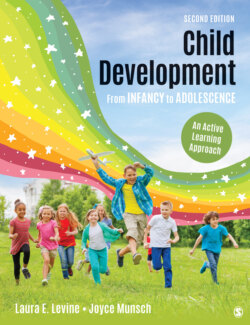Читать книгу Child Development From Infancy to Adolescence - Laura E. Levine - Страница 78
На сайте Литреса книга снята с продажи.
Knowing Your Sources
ОглавлениеKnowing the source of the information you are using is the first step in becoming an informed consumer. You should ask yourself if you are getting information from someone who is knowledgeable about the topic and is providing objective and unbiased information, or if you are getting information from someone who is not credible or is presenting personal opinion as though it were fact.
Your campus library owns many journals, books, and professional publications in the field of child development, and you can trust these to be reliable sources of information. Many of them are available through your library’s electronic databases. For students of child and adolescent development, the PsycINFO and ERIC (Education Resources Information Center) databases are probably of greatest interest. PsycINFO contains over 4 million records that include peer-reviewed journals, books, and dissertations from the 17th century to the present (American Psychological Association, 2017b). ERIC is sponsored by the U.S. Department of Education and contains journal and other education-related materials, including conference papers and reports, from 1966 to the present (Institute of Education Sciences, n.d.). In these databases, you can find abstracts of articles (brief summaries of the research done and the conclusions drawn from it) and information on how to locate the complete articles.
The reason you can have confidence in the information you find in professional journals is that many of them use a peer review process to determine which articles they will publish. Articles that are submitted to a journal are reviewed by professionals knowledgeable about the topic of the research before it is accepted for publication. This process ensures that the information in peer-reviewed journals has passed professional scrutiny before it gets into print. When you turn to the Internet to find information, you need to provide your own scrutiny and use good judgment. Remember that anyone can post information on the web, so the author of a web page does not necessarily have any particular expertise. Their information may simply be wrong, or it may be opinion masquerading as fact. This is especially a risk when you are researching a controversial topic. While commercial sites may provide some amount of legitimate information, their real intent is to sell you a product.
Peer review: A process in which professionals critique an article and make suggestions for improvement before it is published.
Although the Wikipedia website is popular with college students, anyone can write an article or edit an existing post on the site. An author does not have to have any expertise on a topic to post an entry. For these reasons, Wikipedia is not considered a reliable source of information for most purposes. If you do use a site like this, use it only as a starting point for background information. Many Wikipedia entries include a bibliography of professional books and articles that may help send you in the right direction to find scientific information on the topic you are researching.
By completing Active Learning: Evaluating Information on the Web, you can use the same guidelines many libraries use to evaluate a webpage that interests you.
Active Learning: Evaluating Information on the Web
Begin this activity by picking a topic related to child development that you would like to know more about. For example, what is the effect of violent video games on children’s level of aggression, or how does parental divorce affect teens’ romantic relationships? Find a website devoted to this topic through a search engine such as Google and evaluate it using the criteria below.
Name of the site you found:__________________
URL:__________________
Source: Kapoun, J. “Teaching undergrads Web evaluation: A guide for library instruction,” C&RL News (July/August 1998): 522–523. Reprinted by permission of Jim Kapoun.
What is your overall evaluation of the accuracy and helpfulness of this site?
____________________________________
____________________________________
Next, log on to PsycINFO through your campus library website and search for the same research topic. Be sure to enter specific search terms for the topic you’ve chosen, not a full sentence or phrase; for example, enter video games on one line and aggression on the next rather than entering effect of video games on aggression on one line. Chances are your search will return many published articles. If it doesn’t, try changing one or more of your search terms. For instance, if you searched for teenagers, you could try searching for adolescents. Choose one or two of the articles that you find that give you electronic access to the full text of the articles and look over the information.
What are advantages and disadvantages of using the Internet versus PsycINFO for finding information on child development? How much do you trust the information in each? What gives you confidence in the results you found?
